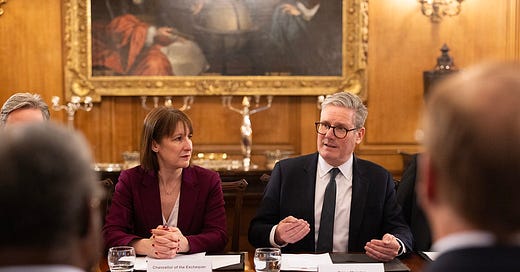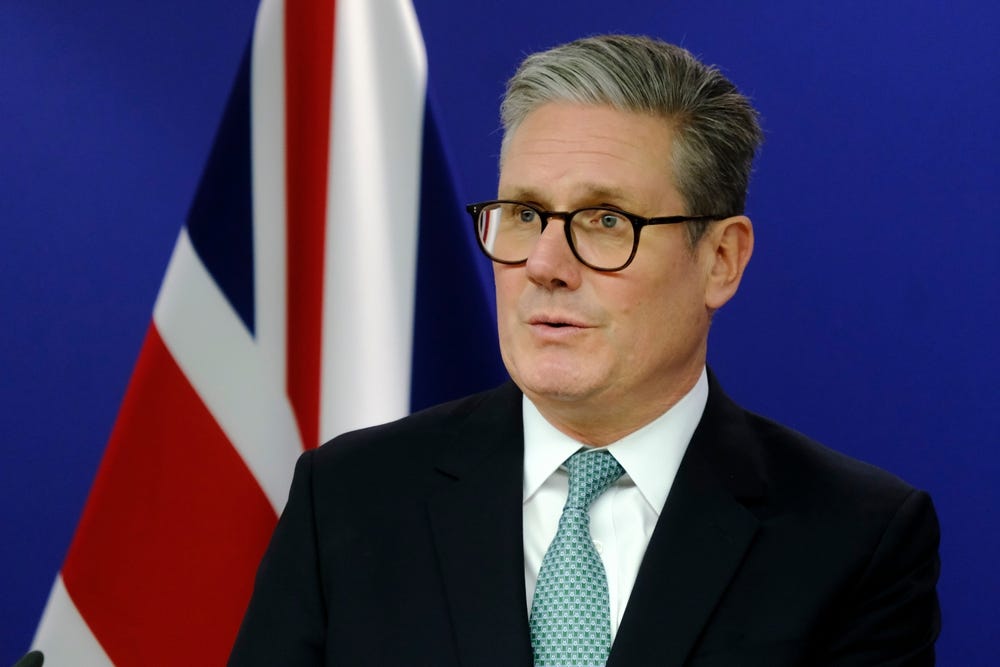Labour’s unemployment trap
Critics say that the government’s economic plans are riddled with contradictory policies
The government’s economic policies risk placing Britain in an unemployment trap, in which plans to boost employment are undermined by higher tax and regulatory burdens on employers, according to critics.
Today, the Prime Minister Sir Keir Starmer has announced that Britain “simply isn’t working” as his government unveiled a series of new policies designed to combat worklessness and increase employment. Broadly, the Prime Minister’s solution is to overhaul job centres, send NHS staff to areas with high rates of chronic unemployment to clear backlogs, and provide “a more personalised” service for those looking for work.
The policies target a serious problem that has plagued the British economy since the pandemic. Currently, there are 2.8 million people across the country out of work due to long-term sickness. Correspondingly, public spending on sickness benefits is due to exceed £100 billion by 2029 – more than double the pre-pandemic level. For context, the UK is due to commit £57.1 billion to defence during 2024/2025 under current spending plans.
Yet today’s announcement has laid bare the contradictions at the heart of Labour’s economic vision. The Prime Minister will struggle to combat Britain’s worklessness crisis or cut its spiralling welfare bill so long as his government lumbers employers with heavier burdens and creates an unattractive environment for investors.
Indeed, the government’s approach to the private sector threatens to undermine its war on worklessness. By raising employers’ national insurance contributions in the recent budget, the Chancellor, Rachel Reeves, brushed aside warnings from British businesses that higher contributions will likely force employers to reduce wages or forego expanding their businesses.
On top of this, the Regulatory Policy Committee has warned that the government’s flagship legislation on employment rights is “not fit for purpose”. The independent watchdog warns that the legislation, which is being spearheaded by the Deputy Prime Minister, Angela Rayner, will impose an estimated £5 billion cost per year on businesses.
The Committee concluded: “The proposals could make it more difficult for those unemployed or economically inactive to access jobs … and could lead to increased reliance on internal hiring or recruitment based on personal networks.”
The contradictions do not end there. This is a government which, so it claims, wants to increase investment in the UK, as was signalled by Starmer’s meeting with Larry Fink, the CEO of Blackrock, in Downing Street last week. Yet it also wants to make it harder to invest in oil and gas, is seeking to clamp down on Non-Dom status and believes that those who derive income from assets and investments are not “working people”.
Tellingly, there are signs that ministers know they have overdone the pressure on business. The government is preparing to reduce financial penalties imposed on car manufacturers that fail to meet production targets for electric vehicles. Under the current plans, due to come into force in January, carmakers would have to ensure that 28 per cent of their cars and 16 per cent of their vans are EVs or face a £15,000 green fine for every vehicle manufactured outside of the target.
However, ministers are now reported to be drawing up plans to reduce the planned fines that will be levied after manufacturers warned that the government’s production targets are exceeding demand for EVs. This afternoon, Stellantis, the parent company of Vauxhall, announced that it will be forced to close its factory in Luton – a move which places over 1,000 jobs at risk.
Taken together, the worry must be that Labour’s economic policies show a disregard for the concerns of business. More alarmingly, they indicate that Labour is resorting to its knee-jerk response of using a bigger state to solve pressing economic problems, enlarging the public sector at the expense of the private sector.
Yet public-sector initiatives to encourage Britain’s unemployed will be of little use if employers are forced to cut back their workforces or lower wages. And providing a personalised approach to job-seeking is unlikely to be effective if the government cannot also inspire a genuine will to work. The government may find that it is difficult to tackle the behaviour and incentives that underpin worklessness without making the politically difficult decision to cut back the generosity of the welfare state.
Ultimately, the government’s contradictory policies on work and welfare all appear to indicate that the man at the top – the Prime Minister himself – lacks a clear economic vision for the country. The danger is that Labour’s incoherent set of policies will ensnare the British economy in a trap of higher unemployment, lower productivity and stagnating growth.
Jack Dickens
Reaction Reporter
ON REACTION TODAY
Adam Boulton
Labour must prepare for the coming populist backlash
ALSO KNOW
Netanyahu announces ceasefire deal with Hezbollah in Lebanon - Israeli prime minister Benjamin Netanyahu announced that his security cabinet will approve a ceasefire deal to end the fighting between Israel and Hezbollah in Lebanon. This evening, he declared victory over the Lebanese militant group and vowed that Israelis forced to flee their homes in Northern Israel would return. The terms of the deal are believed to be based on UN Resolution 1701, which ended a 36 day war between Israel and Hezbollah in 2006, and will give Israel 60 days to withdraw its forces from Southern Lebanon. The full cabinet is due to discuss the terms of the ceasefire this evening.
Trump threatens 25 per cent tariffs on Canada and Mexico - President-elect Trump is already stirring the pot with the US’s neighbours by promising sweeping tariffs on day one of his Presidency. The proposed tariffs would lead to steep price increases for a number of goods in the United States and would violate current arrangements with two of the United States’ largest trading partners. Trump also claimed a 10 per cent additional tariff would hit China for “attacking” the US with fentanyl. The seriousness of Trump’s threat is being questioned as he often leads with a maximalist approach prior to negotiation.
Mystery drones spotted over British air bases - Several unidentified drones have been spotted for the second time in two weeks over three air bases in Britain that are used by the United States Air Force. The sightings occurred at RAF Feltwell in Norfolk, and RAF Lakenheath and RAF Mildenhall, in Suffolk. Officials are investigating.
Five rescued in Egypt boat disaster - Emergency responders succeeded in saving several people a full day after the tourist boat ferrying their group sank in the Red Sea. Of the 44 on board, 33 have now been rescued. Today, four bodies were also recovered today, but two Britons remain among the missing.
Violence breaks out as supporters of Imran Khan storm Pakistan’s capital - Tens of thousands of protestors rallying for the release of former PM Imran Khan reached the capital, Islamabad, after weeks of marching. At least four have been killed in clashes that the current PM categorises as "extremism". The protestors demand the immediate release of Khan from prison and for the federal government to disband. Khan alleges that the corruption charges against him and other PTI party members are trumped up and aim to crush political opposition.
NATO-sceptic, Putin-sympathetic candidate wins first round of Romanian election - Calin Georgescu, a far-right candidate, has won the contest for the Romania’s Presidency in the first round, setting him up to compete in a run-off in December. Georgescu has previously pledged to make Romania “neutral” in the conflict between Ukraine and Russia. His victory in the initial vote has sent shockwaves across NATO given that Romania serves as a crucial front-line member in the security bloc.
FIVE THINGS
Curated by the Reaction Team - Josh Schlicht
1975, the year that made the modern world, by Damin Valdez in Engelsberg Ideas
Migration: even the data we do have is broken, writes Neil O’Brien on Neil’s Substack
Romania’s far-right, pro-Russian lurch spells big trouble for EU and NATO, Nicholas Vinocur in POLITICO
Starmer can’t ignore the sickness benefits crisis, writes Ross Clark in The Spectator
Clara Broekaert and Colin P. Clarke explain How Hezbollah Diversified Its Funding in Foreign Policy






